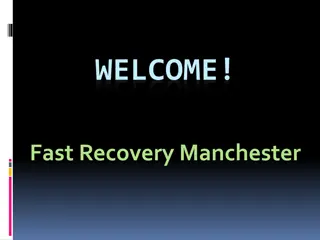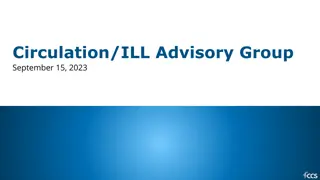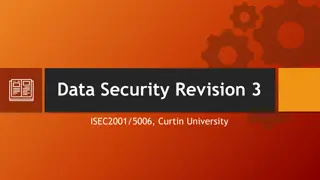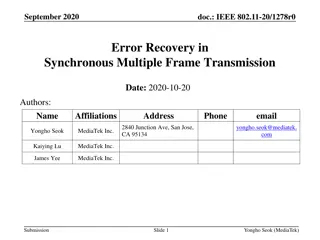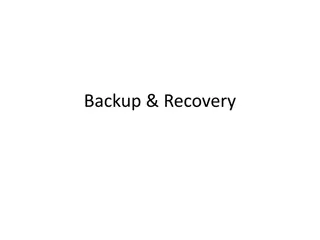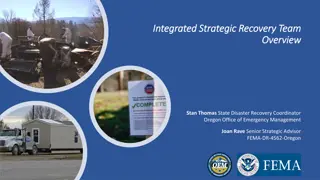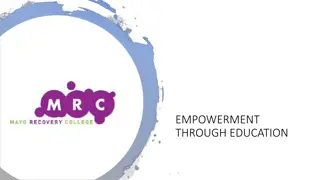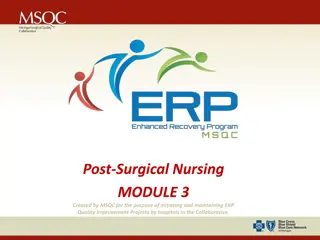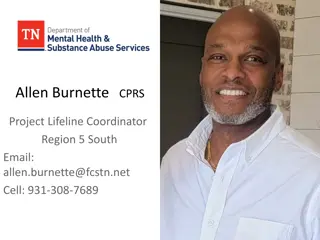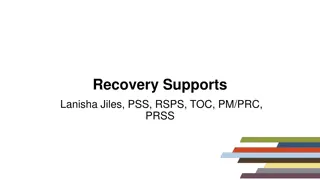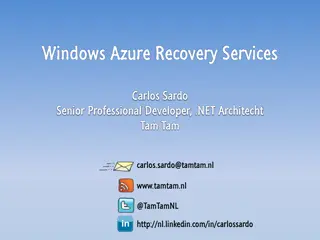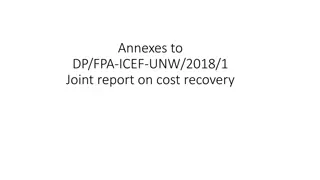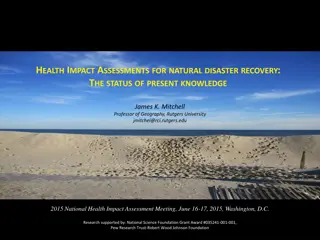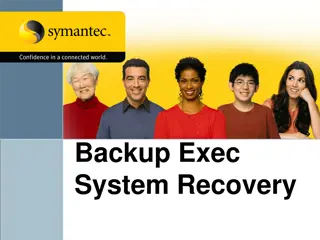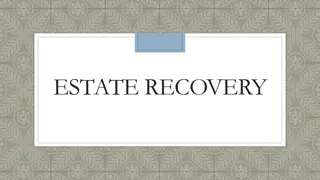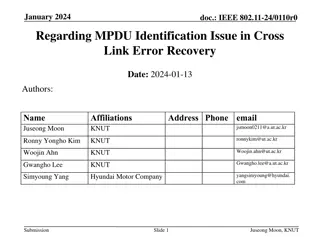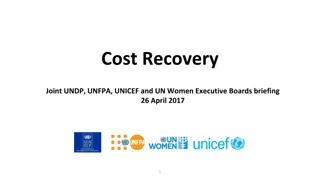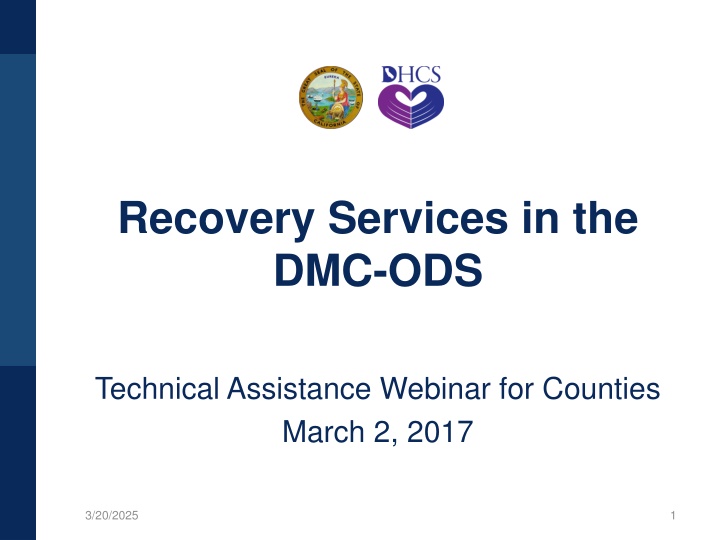
Recovery Services in DMC-ODS for Counties - Overview and Components
Learn about the essential components of recovery services in the DMC-ODS program, including outpatient counseling, recovery monitoring, substance abuse assistance, family support, and more. Understand the importance of recovery services post-treatment and access for MAT recipients. Discover the significant role of wellness-oriented services in empowering beneficiaries for self-management in their health journey.
Download Presentation

Please find below an Image/Link to download the presentation.
The content on the website is provided AS IS for your information and personal use only. It may not be sold, licensed, or shared on other websites without obtaining consent from the author. If you encounter any issues during the download, it is possible that the publisher has removed the file from their server.
You are allowed to download the files provided on this website for personal or commercial use, subject to the condition that they are used lawfully. All files are the property of their respective owners.
The content on the website is provided AS IS for your information and personal use only. It may not be sold, licensed, or shared on other websites without obtaining consent from the author.
E N D
Presentation Transcript
Recovery Services in the DMC-ODS Technical Assistance Webinar for Counties March 2, 2017 3/20/2025 1
Overview of Presentation Overview of Recovery Services Peer Support Services in the DMC- ODS (IN 17-008) Billing for Recovery Services Rate Development for Recovery Services County Perspective Marin County Questions and Discussion 3/20/2025 2
Overview of Recovery Services 3/20/2025 3
Overview Wellness-Oriented. Recovery services are important to beneficiaries in the recovery and wellness process. The treatment community becomes a therapeutic agent through which patients are empowered and prepared to manage their health and health care. Treatment Goals. Treatment is designed to: Emphasize the beneficiary s central role in managing their health. Promote the use of effective self-management support strategies. Provide internal and community resources to support ongoing self-management. Required Benefit. Recovery services are required in all counties that elect to participate in the DMC-ODS pilot program. 3/20/2025 4
Components of Recovery Services Outpatient Counseling: In the form of individual or group counseling to stabilize the beneficiary, then reassess if further care is needed. Recovery Monitoring: Including recovery coaching and monitoring via telephone/telehealth. Substance Abuse Assistance: Peer-to-peer services and relapse prevention. Support for Education and Job Skills: Including linkages to life skills, employment services, job training, and education services. Family Support: Including linkages to childcare, parent education, child development support services, and family/marriage education. Support Groups: Including linkages to self-help and faith-based support. Ancillary Services: Including linkages to housing assistance, transportation, case management, and individual services coordination. 3/20/2025 5
Access to Recovery Services Post-Treatment. Recovery Services are made available to eligible beneficiaries after they complete their course of treatment. Relapse Prevention and / or Early Intervention. Services are available to beneficiaries whether they are triggered, have relapsed, or as a preventative measure to prevent relapse. Client Plan. Services should be provided in the context of an individualized client plan that includes specific goals. This may include the plan for ongoing recovery and relapse prevention that was developed during discharge planning when treatment was completed. 3/20/2025 6
Access to Recovery Services for MAT Recipients MAT through a NTP: Beneficiary should access any related counseling services through the NTP provider since counseling and other supports are included as part of the NTP program. MAT through a non-NTP setting: Beneficiary should access medically necessary recovery services through certified DMC providers after their course of treatment (other than ongoing medication support) has been completed. 3/20/2025 7
Treatment Settings Service Delivery. Recovery Services can be provided in the following ways: Face-to-face By telephone By telehealth In the community DMC Certification. Sites offering recovering services must be certified as an DMC provider. This does not mean that services must be provided at the certified site. Services may be provided in the community. Services provided in the community must be linked with a physical site / facility that is DMC certified. 3/20/2025 8
Who Can Provide Recovery Services Broad Range of Providers. Recovery services may be provided by the following types of providers: Licensed Practitioner of the Healing Arts (LPHA) Certified Counselor Peers (when provided as substance abuse assistance services as a component of recovery services) 3/20/2025 9
Peer Support Services in the DMC-ODS (IN 17-008) 3/20/2025 10
Peer Support Services Substance Abuse Assistance. Peer-to-peer services are eligible for reimbursement under the DMC-ODS pilot when provided as substance abuse assistance services, as a component of recovery services. Training Plan Required. For counties that offer peer support services through the DMC-ODS, the county must first submit a SUD Peer Support Training Plan to DHCS for approval prior to providing billable peer support services. Provider Eligibility Verification. Counties are also responsible for ensuring that covered services are provided by peers that are eligible for participation in the Medi-Cal program. Review the OIG excluded list & the Medi-Cal suspended or ineligible list: http://files.medi- cal.ca.gov/pubsdoco/SandILanding.asp 3/20/2025 11
Peer Support Training Plan The SUD Peer Support Training Plan must describe the following: 1. Client plan development, documentation, supervision, and oversight 2. Training and designation The SUD Peer Support Training Plan should not exceed five (5) pages. SUD Peer Support Training Plans should be emailed to DHCS at DMCODSWAIVER@dhcs.ca.gov For more information, see Information Notice 17-008 (dated February, 2017) 3/20/2025 12
Billing for Recovery Services 3/20/2025 13
HCPCS and Modifiers The U6 modifier is used to classify any service as a recovery service The billable components for recovery services (RS) are individual counseling, group counseling, case management, and recovery monitoring H0004/U6 = RS individual counseling H0005/U6 = RS group counseling H0006/U6 = RS case management T1012/U6 = RS recovery monitoring 3/20/2025 14
Recovery Services Units of Service 1 Unit of Service = 15 minutes Recovery Services can be billed using minutes or units (fractions are allowed) Recovery Services Group Counseling will also require the group billing formula the same as ODS ODF Group Counseling 3/20/2025 15
Group Billing Formula Number of minutes for the group / Number of beneficiaries = Total minutes per beneficiary If there is more than one counselor in the group, each counselor will need to calculate the correct number of minutes per beneficiary based on the actual time spent providing a service to the group The progress note should clearly indicate length of group session, with start & end time, and with documentation time included (or documentation time clearly recorded separately). Both the number of group participants and the number of staff group facilitators need to be documented. 3/20/2025 16
Group Billing Formula2 Example: 10 beneficiaries for 75 minutes group 75 divided by 10 equals 7.5 minutes Bill 7.5 minutes per each beneficiary If there are 2 staff: Each staff will bill for his or her time in the group separately. The reimbursement for the group session should cover the staff time. 3/20/2025 17
Recovery Services and Same Day Billing Recovery Services are available to beneficiaries that have completed treatment Recovery Services can be provided by a single provider The certification of the provider will inform the claiming of the correct level of care code to use Claims for recovery services will be limited to the same provider within the same level of care Claims for recovery services will not be allowed at the same time as claims for treatment services 3/20/2025 18
Rate Development for Recovery Services 3/20/2025 19
Recovery Services Rate Important things to consider when developing a recovery service rate: There are four billable services available: Individual and Group Counseling, Case Management, and Recovery Monitoring Rates already exist for three of these services The only rate you need to add is for Recovery Monitoring 3/20/2025 20
Recovery Services Rates The importance of having a separate billing code for the four recovery services: The detail will allow the evaluation of ODS encounters to distinguish between the different components of recovery services Having a separate rate for recovery monitoring allows for consideration of using peer to peer services 3/20/2025 21
Recovery Services Rates2 Peer Services have different provider qualifications than the other recovery service components, and as a result will potentially have a different cost associated The rate for Recovery Monitoring can be established to consider peer services specifically 3/20/2025 22
County Perspective Marin County 3/20/2025 23
RECOVERY COACHING: BUILDING LASTING RECOVERY IN THE DMC-ODS Marin County Division of Behavioral Health and Recovery Services March 2, 2017
SAMHSA Definition of Recovery A process of change through which individuals improve their health and wellness, live a self-directed life, and strive to reach their full potential. Health Home Recovery Purpose Community
Implementing Recovery Services in Marin County In 2010, hired our first Recovery Coach/Care Manager (Independent Contractor) for the Adult Drug Court program Marin contracts with 3.0 FTE Independent Contractors and is currently recruiting for an additional 1.0 FTE to serve as Recovery Coach/Care Managers: 2.0 FTE for Adult Drug Court, SB 678 and AB 109 referrals 1.0 FTE for females (justice and non-justice involved referrals) 1.0 FTE for other DMC-ODS beneficiaries Minimum Qualifications: At least two (2) years of experience providing care management and recovery-oriented services; AOD certification or licensure Caseload: Approximately 30 50 clients/month per 1.0 FTE
What Recovery Coaches Do in Marin Assists individuals in making choices about which recovery pathway(s) will work for them - Devotes a great deal of time to connecting the person in early recovery to community health, employment, housing, educational, and social services and resources Teach the individual the skills to manage their substance use disorder and achieve their goals in life Aid the individual, and often families, by coordinating ancillary activities and leaving the client free to focus upon his or her ongoing recovery Use motivational interviewing techniques to keep individuals actively engaged in their recovery Provide services in the client s community (face-to-face) and via telephone Referrals are largely from Probation and substance use treatment providers
Implementing Recovery Services in Marin County Preparation for DMC-ODS Linkage to DMC Certified Site: Added Recovery Coach/Care Managers as staffing to the County-operated DMC IOT/ODF clinic Provided training on ASAM Criteria and Title 22 Updating outcome measures and tools Adapting service models: Expanding individually-based recovery support services to also include group-based recovery support services Identifying additional sites/providers of recovery services
Questions and Challenges Shifting Recovery Services to only being accessible post-treatment CalOMS: Will CalOMS requirements be the same for Recovery Services as they are for treatment admissions? What service type should be indicated? Claiming: Implementing and training providers new to DMC on claiming Recovery Services Documentation: In addition to guidance from related services outlined in Title 22 (e.g. counseling, timelines), are there other documentation standards that should be used?
QUESTIONS AND ANSWERS D.J. Pierce, OTR/L, MPA Marin County Alcohol and Drug Program Administrator 415.473.6652 / dpierce@marincounty.org Catherine Condon, MPH Program Manager 415.473.4218 / ccondon@marincounty.org Smart Justice Video on Recovery Coaching in Marin: http://www.counties.org/post/smart-justice-marin-county
Questions and Discussion For optimal sound quality, please ensure that you are dialed-in using your phone and that you have inputted your audio PIN. 3/20/2025 31
DMC-ODS Resources For additional information, please see the DMC-ODS Resources section of the DHCS Website: http://www.dhcs.ca.gov/provgovpart/Pa ges/DMC_ODS_Resources.aspx? For questions, please contact dmcodswaiver@dhcs.ca.gov 3/20/2025 32
California Department of Health Care Services Karen Baylor, PhD, Deputy Director, MHSUDS, DHCS Marlies Perez, Division Chief, MHSUDS, DHCS Don Braeger, Division Chief, MHSUDS, DHCS For More Information: http://www.dhcs.ca.gov/provgovpart/Pages/Drug-Medi- Cal-Organized-Delivery-System.aspx 3/20/2025 33
Harbage Consulting Don Kingdon, PhD, Principal, Behavioral Health Integration don@harbageconsulting.com Molly Brassil, MSW, Director, Behavioral Health Integration molly@harbageconsulting.com Courtney Kashiwagi, MPH, Senior Policy Consultant courtney@harbageconsulting.com Erynne Jones, MPH, Senior Policy Consultant erynne@harbageconsulting.com 3/20/2025 34

